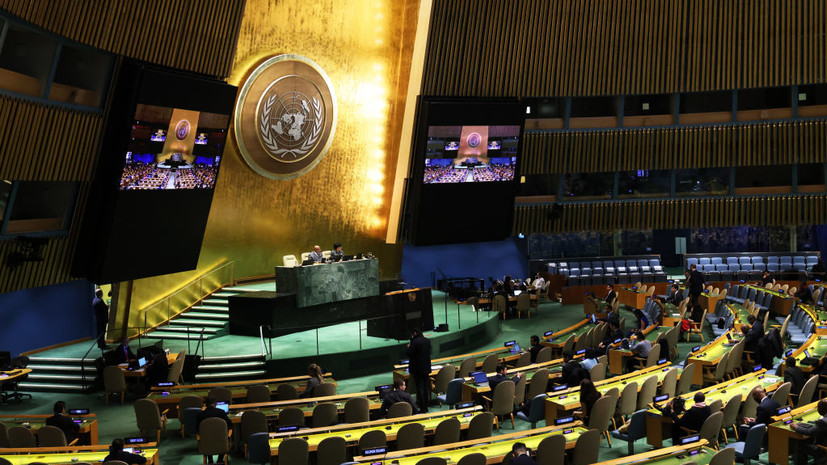The UN General Assembly adopted Russia's resolution entitled "Combating the glorification of Nazism, neo-Nazism and other practices that contribute to fuelling contemporary forms of racism, racial discrimination, xenophobia and related intolerance."
According to RIA Novosti, 118 countries voted for the document, including Russia, Belarus, China, India, Syria, Israel, Argentina, Armenia, Azerbaijan, Bolivia, Brazil, Cameroon, CAR, Colombia, Cuba, North Korea, Egypt, Eritrea, Ethiopia, Gabon, Iraq, Kazakhstan, Kenya, Nicaragua, Pakistan, Peru, Qatar, Kyrgyzstan, Kuwait, Libya, Mali, Mexico and others.
49 countries voted against, including the United States, Canada, Japan, the United Kingdom, Germany and Ukraine.
The document, among other things, strongly condemns incidents related to the glorification and propaganda of Nazism, calls on states to eliminate all forms of racial discrimination, and also opposes the revision of the history and results of World War II.
Also at the russian.rt.com, Lavrov doubted the sincerity of Berlin, Rome and Tokyo's repentance for World War II
Russia's Deputy Permanent Representative to the UN, Maria Zabolotskaya, said that the resolution, introduced almost 20 years ago, is aimed at confirming the historical truth about the victory over Nazism, as well as drawing attention to modern followers of ideas of racial superiority and pointing out the unacceptability of racist and xenophobic rhetoric.
According to Zabolotskaya, a group of Western countries made an attempt to turn the Russian initiative into a political document, which completely does not correspond to the status and direction of the resolution.
"This resolution is aimed at dialogue and cooperation, not labeling and confrontation. The problems identified in it are of a cross-border nature and affect the situation in many countries of the world," the press service of the Russian Permanent Mission to the UN quoted Zabolotskaya as saying.
She added that if any of the states reflected their problems in the resolution, then they should work towards solving them, instead of trying to undermine cooperation in the field of countering neo-Nazism, racism and xenophobia.
"Putting aside recent attempts to cover up their rejection of the resolution with ridiculous excuses, references to freedom of assembly and speech, these countries openly opposed international efforts to combat aggressive manifestations of racism and xenophobia by introducing a hostile amendment by voting against the text of the resolution," she said.
Earlier, Western countries made an amendment to the document condemning the Russian special operation in Ukraine. The Russian Foreign Ministry called this step an attempt to disrupt the adoption of the resolution.
At the same time, Zabolotskaya noted that "the results of the vote speak for themselves" and clearly demonstrate the commitment of the international community to eradicate the phenomena specified in the resolution.
Incident in the Canadian Parliament
A wide resonance in the West and in Russia was caused by the celebration of the former militant of the SS division "Galicia" Yaroslav Gunka in the Canadian parliament in September. Speaker of the House of Commons Anthony Rota presented the Nazi as a "Ukrainian hero."
Subsequently, Vladimir Putin repeatedly spoke about these events, noting that it was a manifestation of Nazism. In a conversation with servicemen after the presentation of Gold Star medals on the occasion of Heroes of the Fatherland Day in early December, the president recalled that during the events in the Canadian parliament, Zelensky stood up, although the speaker said that this man fought against the Russians during the war.
"And who fought against the Russians during World War II? Fascists. Everyone knows this, and the President of Ukraine knows it. Nevertheless, everyone stood up, the whole parliament stood up and applauded him. Isn't this a manifestation of Nazism?" the Russian leader stressed.
In addition, on December 7, the Prosecutor General's Office of Russia sent a request to the Canadian authorities for the extradition of Yaroslav Gunka. The Russian authorities accuse a former soldier of the SS Galicia Division of genocide of the civilian population of the Ukrainian SSR during the Great Patriotic War.

